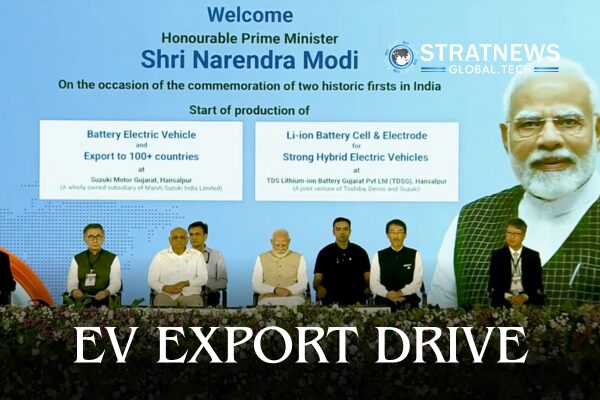India Emerges as a Global Hub for Electric Vehicle Manufacturing
Prime Minister Narendra Modi inaugurated major green mobility initiatives at the Suzuki Motor plant in Hansalpur, Gujarat. This event marks a turning point for India’s electric vehicle (EV) sector under the Make in India campaign. Highlighting India’s progress, the Prime Minister launched the “e-VITARA”, Suzuki’s first global Battery Electric Vehicle (BEV) manufactured in India. Starting today, India will begin EV exports to over 100 countries, including Europe and Japan. PM Modi noted that this achievement reflects India’s strength in democracy, demography, and a skilled workforce—making it an attractive destination for global manufacturers.
Boosting Battery Manufacturing and Self-Reliance
A key focus of the event was the local production of hybrid battery electrodes. The Prime Minister launched this phase at the TDS Lithium-Ion Battery plant—a joint venture between Toshiba, Denso, and Suzuki. With this initiative, more than 80% of battery value will now be produced domestically.
This step aligns with the broader Aatmanirbhar Bharat vision. PM Modi also announced a new initiative involving three Japanese firms that will manufacture battery cells in India. This development is expected to drive rapid growth in the hybrid EV sector.
Support for Clean Mobility and Innovation
During his speech, the Prime Minister underlined how clean mobility is central to India’s future. He recalled proposing the idea of converting old ambulances into hybrids during his visit to Singapore. Maruti Suzuki responded quickly, developing a prototype within six months. These hybrid ambulances will align with the ₹11,000 crore PM E-DRIVE scheme, promoting clean transport solutions.
PM Modi also highlighted that India’s EV batteries were once fully imported. Now, thanks to domestic production, India is moving closer to energy independence.
Manufacturing Reforms and Future Vision
PM Modi noted that the Make in India campaign, launched in 2014, has created a positive environment for both domestic and international manufacturers. He said major reforms have made investing in India easier, citing a 500% increase in electronics production and a 2,700% rise in mobile manufacturing over the past decade.
Looking ahead, India will focus on futuristic industries. Six new semiconductor plants are planned across the country. The government is also addressing rare earth shortages through the National Critical Mineral Mission, which will conduct over 1,200 mineral exploration campaigns nationwide.
Strengthening India-Japan Ties
Reflecting on the strong ties between India and Japan, PM Modi announced an upcoming visit to Japan. He noted that the partnership, which began with Maruti Suzuki, has now evolved into a deep cultural and economic connection. He recalled early support for Japanese investors in Gujarat, from translating industrial rules into Japanese to building golf courses and offering Japanese cuisine.
The Prime Minister urged firms like Maruti Suzuki to support youth exchange programmes and skill development between the two countries.
As India continues its journey towards becoming a developed nation by 2047, PM Modi expressed confidence that Japan will remain a key partner in this mission.


